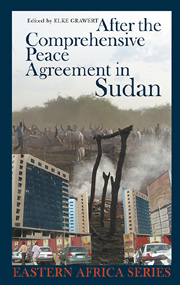Book contents
- Frontmatter
- Contents
- List of Tables & Figures
- Editor's Preface
- Notes on Contributors
- List of Acronyms
- Map of Sudan
- 1 Introduction
- I Implementation & Potential of the CPA
- II Challenges Facing Post-war Societies in Sudan
- 5 The CPA & Beyond
- 6 Ethnic Identity Politics & Boundary Making in Claiming Communal Land
- 7 Return Migration to the Nuba Mountains
- 8 Challenges of Basic Education in Southern Sudan
- 9 Abduction, Confinement & Sexual Violence against South Sudanese Women & Girls in Kakuma Refugee Camp, Kenya
- 10 Identity, Citizenship & Reintegration
- III The CPA in its Sub-regional Context
- IV Beyond the CPA
- Index
- EASTERN AFRICAN STUDIES
9 - Abduction, Confinement & Sexual Violence against South Sudanese Women & Girls in Kakuma Refugee Camp, Kenya
from II - Challenges Facing Post-war Societies in Sudan
Published online by Cambridge University Press: 05 April 2013
- Frontmatter
- Contents
- List of Tables & Figures
- Editor's Preface
- Notes on Contributors
- List of Acronyms
- Map of Sudan
- 1 Introduction
- I Implementation & Potential of the CPA
- II Challenges Facing Post-war Societies in Sudan
- 5 The CPA & Beyond
- 6 Ethnic Identity Politics & Boundary Making in Claiming Communal Land
- 7 Return Migration to the Nuba Mountains
- 8 Challenges of Basic Education in Southern Sudan
- 9 Abduction, Confinement & Sexual Violence against South Sudanese Women & Girls in Kakuma Refugee Camp, Kenya
- 10 Identity, Citizenship & Reintegration
- III The CPA in its Sub-regional Context
- IV Beyond the CPA
- Index
- EASTERN AFRICAN STUDIES
Summary
Introduction
Numerous studies about the post-conflict realignment of societies have shown that, apart from the physical gaps which communities experience during war, the most destabilising effect may be the attack on culture by war and insecurity. In many African societies, culture defines the major growth stages in the lives of children; it is now widely recognised that childhood is both a social and cultural construction and that a diversity of childhoods exists both between and within different cultures (Boyden 1990). Studies show that the evolution of culture in protracted refugee situations has a higher impact on individuals in their formative years in the sense that the socialisation of children moves away from the nuclear family and clan towards a heavier dependence upon the community for child protection, thus making their socialisation process more subject to external rather than internal influences (Boyden 1990; Boyden/Gibbs 1997; Honwana 1999a, 1999b).
In emphasising the rights of refugees to family life, Barbara Harrell- Bond (2000) argues that many families are broken, children being cared for by only one parent, or without either parent. Sometimes, a child has to act as head of the family, trying to care for her/his younger siblings. In camp situations, children often lose role models to guide their development. Even where both parents are present, these children grow up under abnormal conditions. To feed their children, parents are dependent on hand-outs from strangers. Parents are deprived of their authority; their roles as carers and breadwinners are undermined by their dependence on a system over which they have no control.
- Type
- Chapter
- Information
- After the Comprehensive Peace Agreement in Sudan , pp. 158 - 175Publisher: Boydell & BrewerPrint publication year: 2010

